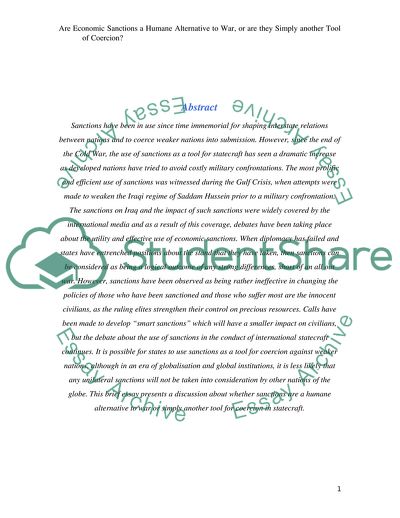Cite this document
(Are Sanctions a Humane Solution to End a War Research Paper, n.d.)
Are Sanctions a Humane Solution to End a War Research Paper. https://studentshare.org/politics/1705465-are-economic-sanctions-a-humane-alternative-to-war-or-are-they-simply-another-tool-of-coercion-support-our-arguments-with-relevant-examples
Are Sanctions a Humane Solution to End a War Research Paper. https://studentshare.org/politics/1705465-are-economic-sanctions-a-humane-alternative-to-war-or-are-they-simply-another-tool-of-coercion-support-our-arguments-with-relevant-examples
(Are Sanctions a Humane Solution to End a War Research Paper)
Are Sanctions a Humane Solution to End a War Research Paper. https://studentshare.org/politics/1705465-are-economic-sanctions-a-humane-alternative-to-war-or-are-they-simply-another-tool-of-coercion-support-our-arguments-with-relevant-examples.
Are Sanctions a Humane Solution to End a War Research Paper. https://studentshare.org/politics/1705465-are-economic-sanctions-a-humane-alternative-to-war-or-are-they-simply-another-tool-of-coercion-support-our-arguments-with-relevant-examples.
“Are Sanctions a Humane Solution to End a War Research Paper”. https://studentshare.org/politics/1705465-are-economic-sanctions-a-humane-alternative-to-war-or-are-they-simply-another-tool-of-coercion-support-our-arguments-with-relevant-examples.


